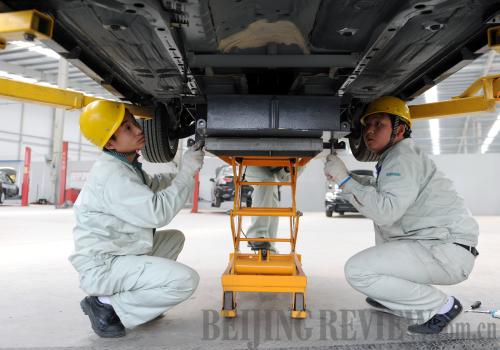|
 |
|
READY TO GO: Xinneng Electric workers install a battery onto a vehicle in Xinxiang, Henan Province on April 16 (LI BO) |
Pan Lei, a Chinese electric vehicle (EV) maker, praised an American girl Esha Khare for a great advancement in a fast-charging capacitor. The 18-year-old high school graduate from California won the Intel Foundation Young Scientist Award of $50,000 for her invention of an ultra-fast charging gadget that can load power into a phone in just 20 seconds. Chinese EV manufacturers hope that her invention will be employed to power cars and boost a sector that has long been encumbered by insufficient energy storage technology.
Since 2008 the Chinese Government has thrown its weight behind the development of pure EVs as part of its efforts to boost new-energy automobiles. But long charging hours have become a stumbling block. According to Pan, Director of Market Department of Yangzhou Yaxing Motor Coach Co. Ltd., lead-acid and lithium cells used in pure EVs usually take more than 10 hours to charge.
"I'm trying to contact Esha Khare and ask to join in her research of power-storage cells for EVs," Pan said.
Dubbed as the "supercapacitor," the power-storage gadget was invented more than three decades ago. Currently, the mini-supercapacitor is used in computer memory, camera, audio devices and big supercapacitors are used in automobiles and energy collection.
Supercapacitors store higher amounts of charge than regular capacitors and have garnered attention as energy-storage devices because they charge and discharge faster than batteries. However, unlike batteries, they are limited by low energy densities.
Yangzhou Yaxing Motor Coach Co. Ltd. is one of the two supercapacitor bus makers in China. It officially launched its supercapacitor bus in June. Different from a conventional bus, Yaxing's new model can be charged in eight minutes to run 18 km and is able to dispense 100,000 recharge cycles.
Yaxing's new EV will be exported to Israel, said Pan.
Since the supercapacitor features quick charging and fast discharging, it means it can only run a short distance after one charge. In this sense, it would be best suited for a bus to recharge at every two or three stops. There's a long way to go before the supercapacitor can be used in cars, said Pan.
Golden opportunity
This year scientists from the University of California, Los Angeles, have developed high-performance supercapacitors with graphene electrodes, which could pave the way for a new class of flexible energy-storage devices.
According to CIConsulting, a Shenzhen-based research company, the latest advancement has made supercapacitors the best option for EV energy storage technology and China's supercapacitor market will increase more than 30 percent to 3.38 billion yuan ($551 million) by 2016.
Compared with the United States, China still lags behind in research and development of the supercapacitor. "The next few years will witness big progress in supercapacitor technologies and it will also be an important period for the industrialization of EVs," said Pan.
In fact, most countries have shown their determination to develop EVs, which is also a priority for many global carmakers, including those in China. Data from the China Association of Automobile Manufacturers showed that out of 120 Chinese carmakers, more than 30 have plans to develop EVs.
EVs have serious performance obstacles to overcome before they will be able to compete with conventional gas cars and only battery innovation can accomplish that goal. This is why Chinese EV makers have cheered the new progress in supercapacitors in the United States.
| 